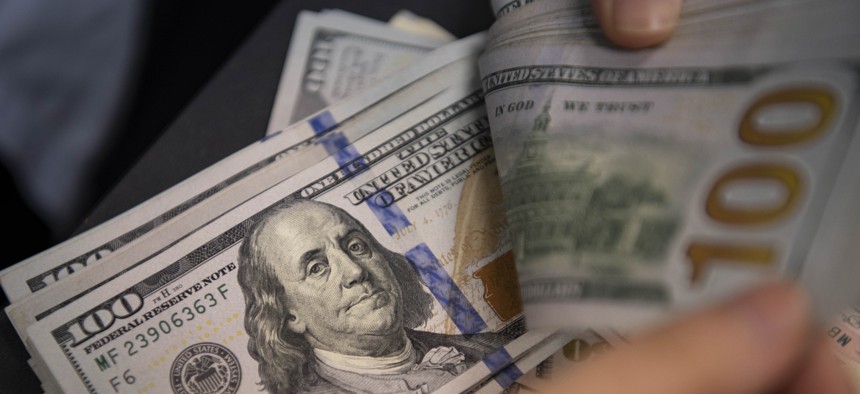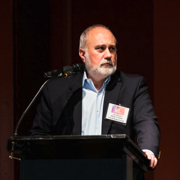Ask the Experts: With inflation spiking, are we headed to recession?
The short answer is ‘Yes, probably,’ even if it’s a mild one. And Florida isn’t immune.

CFOTO/Future Publishing via Getty Images
Mainly because of increased prices for rent, food and gasoline, U.S. inflation shot up in June to a four-decade high. The Consumer Price Index, which measures the average change in prices paid for an assortment of goods and services, rose 9.1% over the last year. As the Associated Press reports, that’s “the biggest yearly increase since 1981, with nearly half of the increase due to higher energy costs.” And most economic forecasters see a recession, even a mild one, looming on the horizon.
City & State consulted with three experts from Florida State University in Tallahassee: William A. Christiansen, the Truist Associate Professor of Finance and longtime chair of the Department of Finance; Randall G. Holcombe, the DeVoe Moore Professor of Economics and the author of 15 books and more than 150 articles in academic and professional journals; and Steven Perfect, an associate professor in the Department of Finance who has directed options trading, quantitative analysis and risk analytics for energy companies. Responses have been edited for clarity and brevity.
What does inflation do besides drive up costs of day-to-day items?
William A. Christiansen: It reduces purchasing power and reduces real wages. It increases interest rates, which typically slows down borrowing and economic activity. Borrowing becomes more expensive for the household sector, for the corporate world, and for governments. It also reduces consumer and business confidence, frequently causes volatility, uncertainty and weakness in the stock market and can reduce the earnings of firms as demand slows.
Randall G. Holcombe: Inflation has economic effects beyond just making things more expensive. It adds uncertainty to the signals that prices send to businesses and consumers. When the price of something rises, is that a signal that it is more expensive relative to alternatives, or is it due to inflation? Inflation is also a tax on holding money. With the inflation rate now exceeding 9%, the purchasing power of a dollar is nine percent less today than it was a year ago.
Steven Perfect: Besides driving up day-to-day costs, inflation also tends to push up interest rates which makes borrowing more expensive. More expensive borrowing, in turn, reduces purchases and investment, which both tend to result in economic slowdown.
What needs to be done now, in your opinion, to rein in inflation?
Christiansen: The supply chain problem has caused slow deliveries, backlogs and higher costs. This is a global issue and it is very difficult for policymakers to address this. This was thought to be a temporary problem a couple of years ago but has developed into more of a chronic problem. It will take time for this to decrease. Also, the Federal Reserve can raise interest rates (like they are doing), which will typically slow the economy. The slowing usually brings inflation down as it curbs spending and aggregate demand. The challenge is to have a soft landing. That means lower inflation without a recession.
Holcombe: The adage that inflation is caused by too much money chasing too few goods very accurately describes its cause. The only way to lower the inflation rate is to slow down the creation of new money. The Federal Reserve Bank, or Fed for short, controls the size of the money supply, so inflation can only be controlled by the Fed’s monetary policy. The Fed uses interest rates as an indicator of monetary policy, so when you hear that the Fed is raising interest rates, that means they are slowing down on money growth. They are going to have to do much more of that than they have currently announced to bring inflation under control.
Perfect: The Fed will have to continue to raise interest rates. Historically, this is one of the most effective ways to curb inflation. It would also be helpful if the U.S. and other countries focused more on increasing energy production. While not necessarily impactful in the near term, it would certainly help energy prices in terms of the market’s expectations.
Does inflation have any effect on home loans (mortgages), student loans or retirement accounts and if so what should people do?
Christiansen: If people are locked into their interest rates, this is good. If people have ARMs (adjustable rate mortgages) or flexible exchange rates, it could lead to higher rates and more expensive payments. Borrowing will become more expensive no matter what the category. It is a bad time to use a variable rate interest when borrowing as rates will likely continue to rise. Lock in to the lowest rate possible. Now is not a good time to borrow but it will likely get worse as interest rates continue to climb.
Holcombe: With regard to mortgages, people who currently have fixed rate mortgages are helped out by inflation, because they will be paying back their mortgages with money that is worth less than the money they borrowed. But inflation leads to higher interest rates, meaning that someone who wants to buy a house in the future will have to pay more in interest. This makes housing more expensive, which can reduce the demand for housing and cause housing prices to fall. One side effect of the current inflation to watch for is a reduction in housing prices.
Like mortgages, inflation reduces the value of money used to repay student loans. If students can get low-interest loans, inflation makes them a better deal for borrowers for that reason.
Finally, if people have retirement accounts that are invested in fixed rate securities, inflation will lower the value of their retirement accounts. The best place to invest retirement savings is in the stock market. Investors may be wary now because the stock market has fallen so much this year, but that’s when they should want to invest in the stock market – when prices are down. You want to buy low, sell high, so now is a good time to move retirement assets from fixed rate investments into common stocks.
Perfect: With respect to loans – mortgages or otherwise – higher inflation tends to translate into higher interest rates, so that's going to increase the borrowing cost of home purchases. We are, in fact, already seeing some slowdown in the real estate sector. Higher interest rates are also going to increase the cost of student loans. While student loans will still be available, the higher interest rates required will inevitably reflect the Fed’s actions as well as inflation expectations.
The impact on retirement accounts, especially retirement accounts holding predominantly low return investments, will likely be low inflation adjusted returns as inflation eats away at purchasing power. Fortunately, maintaining positions in a well-diversified selection of stocks tends to be a good way to protect against the impact of inflation.
In your view, when will things “return to normal,” specifically in Florida?
Christiansen: Florida has done much better than the national economy. It is a growth state and real estate has been especially strong. But Florida is affected by the national economy: interest rates, job growth, overall economic activity, etc. We are all at risk as long as inflation stays high or continues to increase. It will take some time. Most forecasts have a 50% to 75% probability of national recession by the end of 2023. The good news is that oil and gas prices are dropping and the job market continues to be strong.
Holcombe: That’s a tough question! In one sense, things are never normal, but looking ahead, the battle to curb inflation will slow down the economy, and there’s good reason to expect a recession. The only bright spot there is that the unemployment rate is low and the economy is still creating jobs, offering the hope that any recession will be mild. If you’re looking ahead to when the economy will have inflation under control and be up at full employment, the earliest I would see that happening is 2024.
Perfect: I anticipate that the next couple of months will continue to experience elevated levels of inflation, but I think the most recent print of 9.1% for June has probably peaked out in terms of the type of inflation we'll see. We can also expect to see sizeable Federal Reserve rate hikes hitting in the next couple of months which will continue to have an impact in slowing the economy. Ultimately, I think we will probably see inflation at a high level for maybe three to six months, but likely at that point we're going see it coming back down to a more normal range.
